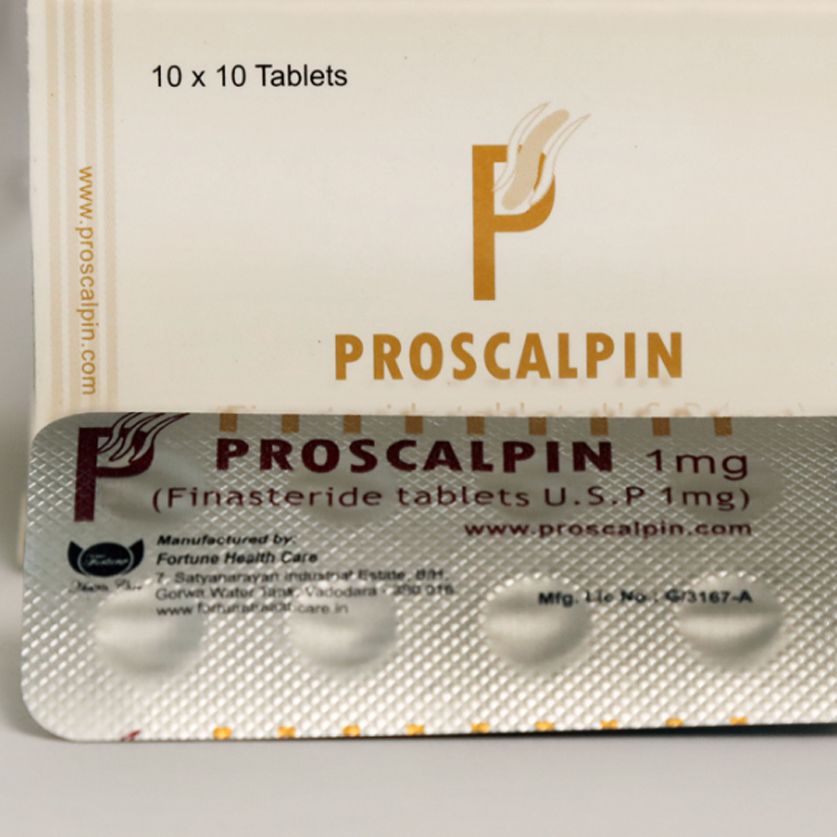description
CONTENT: Proscalpin, 1mg (50 pills)
Finasteride, sold under the brand names Proscar and Propecia among others, is a drug used to treat benign prostatic hyperplasia (BPH) and male pattern baldness (MPB). It is a Type II and Type III 5α-reductase inhibitor; 5α-reductase, an enzyme that converts testosterone to dihydrotestosterone (DHT).
Medical uses
Benign prostate hyperplasia
Ärzte verwenden Finasterid für die Behandlung von BPH, informell bekannt als eine vergrößerte Prostata. Finasterid kann die Symptome, die mit BPH verbunden sind, verbessern, wie z. B. Schwierigkeiten beim Wasserlassen, Aufstehen während der Nacht zum Urinieren, Zögern beim Beginn des Wasserlassens und verminderter Harnfluss. Es gibt weniger symptomatische Erleichterung als Alpha-1-Blocker wie Tamsulosin und symptomatische Erleichterung ist langsamer im Beginn (sechs Monate oder mehr der Behandlung mit Finasterid kann erforderlich sein, um die therapeutischen Ergebnisse der Behandlung zu bestimmen). Symptomatische Vorteile sind vor allem bei denen mit Prostata Volumen> 40 cm3 gesehen. In Langzeitstudien reduzieren Finasterid, aber keine Alpha-1-Inhibitoren das Risiko einer akuten Harnverhaltung (-57% bei 4 Jahren) und die Notwendigkeit einer Operation (-54% bei 4 Jahren). Wenn das Medikament abgebrochen wird,
Male pattern baldness
Finasteride is used to treat male pattern baldness (androgenetic alopecia) in men. The treatment provides about 30% improvement in hair loss after six months of treatment, and effectiveness only persists as long as the drug is taken.
Off-label used
Finasteride is sometimes used in hormone replacement therapy for male-female transsexuals in combination with some form of estrogen due to its anti-androgen properties. However, little clinical research has been conducted into finasteride's use for this purpose and evidence of effectiveness is limited.
Contraindications
Finasteride is not approved for use in women, primarily because of the risk of birth defects in a fetus. It is classified in the FDA pregnancy category X.
Side effects
Finasteride side effects are rare. The FDA has added a warning to 5α-reductase inhibitors about an increased risk of high-grade prostate cancer because treatment for BPH lowers PSA (prostate specific antigen), which could mask the development of prostate cancer.
Although the general incidence of male breast cancer has not increased in clinical trials for finasteride 5 mg, there have been post-marketing reports of breast cancer associated with its use. Available evidence is not clear as to whether there is a causal relationship between finasteride and these cancers.
The effect of finasteride on sexual function is controversial. There have been case reports of persistently decreased libido or erectile dysfunction after stopping the drug and the FDA has updated the label to inform health care professionals of these reports. A 2010 review found moderate quality evidence that finasteride increased the risk of sexual dysfunction, but not that people stopped using it because of the sexual side effects.



